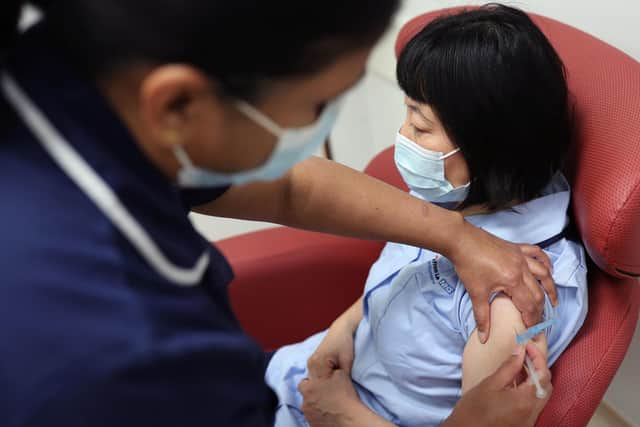Preston and Blackpool hospitals set to commence first Covid-19 vaccinations tomorrow
and live on Freeview channel 276
The NHS will begin vaccinating patients against coronavirus at dozens of hubs this week, with Royal Preston Hospital and Blackpool Victoria Hospital being among the first to receive the vaccine.
It’s the start of the biggest immunisation programme in NHS history which will see people aged 80 and over as well as care home workers being the first to receive the jab, along with NHS workers who are at higher risk.
Advertisement
Hide AdAdvertisement
Hide AdNHS staff worked through the weekend to prepare for the launch of the programme and the arrival of the vaccines with the first injections due to happen tomorrow.


The Preston and Blackpool hospitals are among the 50 hubs in the first wave and more hospitals will start vaccinating over the coming weeks and months as the programme ramps up.
The vaccine is from US and German-owned Pfizer/BioNTech and the UK has ordered 40 million doses in total - enough for 20 million people - with 800,000 of those being part of the first rollout.
Patients aged 80 and above who are already attending hospital as an outpatient, and those who are being discharged home after a hospital stay, will be among the first to receive the life-saving jab.
Advertisement
Hide AdAdvertisement
Hide AdHospitals will also begin inviting over 80s in for a jab and work with care home providers to book their staff in to vaccination clinics.
Any appointments not used for these groups will be used for healthcare workers who are at highest risk of serious illness from covid. All those vaccinated will need a booster jab 21 days later.
GPs and other primary care staff are also being put on standby to start delivering the jab. A small number of GP-led primary care networks will begin doing so next week with more practices in more parts of the country joining in on a phased basis during December and in the coming months.
Vaccination centres treating large numbers of patients in sporting venues and conference centres will also “stand up” when further supplies of vaccine come arrive.
Advertisement
Hide AdAdvertisement
Hide AdProfessor Stephen Powis, NHS national medical director, said: “Despite the huge complexities, hospitals will kickstart the first phase of the largest scale vaccination campaign in our country’s history from Tuesday. The first tranche of vaccine deliveries will be landing at hospitals by Monday in readiness.
“The NHS has a strong record of delivering large scale vaccination programmes – from the flu jab, HPV vaccine and lifesaving MMR jabs – hardworking staff will once again rise to the challenge to protect the most vulnerable people from this awful disease.”
The life-saving vaccine is typically delivered by a simple injection in the shoulder but there is a complex and difficult logistical challenge to deliver from the manufacturers Pfizer to patients.
It needs to be stored at -70C before being thawed out and can only be moved four times within that cold chain before being used.
Advertisement
Hide AdAdvertisement
Hide AdHealth Secretary Matt Hancock said: “This coming week will be an historic moment as we begin vaccination against Covid-19.
“We are prioritising the most vulnerable first and over-80s, care home staff and NHS colleagues will all be among the first to receive the vaccines.
“We are doing everything we can to make sure we can overcome significant challenges to vaccinate care home residents as soon as possible too.
“I urge everybody to play their part to suppress this virus and follow the local restrictions to protect the NHS while they carry out this crucial work.”
Thank you for reading this article. If you value what we do and are able to support us, a digital subscription is only £1 for your first month. Please give it a try today by clicking here.